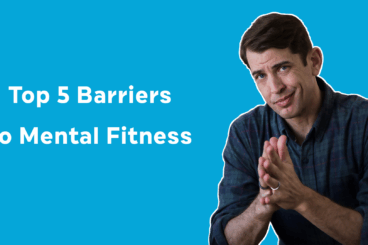Are you worried about your mood this winter or have you noticed that during the winter months as it gets dark and the seasons change, that you start to get a little bit more down, more blue, more tearful? Maybe you get more irritable or you have a hard time focusing or maybe you don’t have as much energy. I’m a board certified psychiatrist, and my focus of my practice has been nutritional psychiatry as well as mental fitness. That’s the subject of my new book, Healing the Modern Brain. I think mental fitness is probably one of the ultimate ways for you to think about keeping your mood up during winter months, and I want to walk you through it.
Mental fitness is an idea around creating a framework that helps you think about the knowledge, the skills, and the habits that you need to optimize your brain health, and then to help prevent or treat any mental health concerns you have. Maybe it’s insomnia, maybe it’s irritability, maybe it’s anxiety, but having a really great proactive plan- that’s called mental fitness. Healing the Modern Brain acknowledges we’re in this new era. Brains have never had to worry about microplastics or doom scrolling or mercury and fish or toxic social media posts. That’s all new. And so in this environment, you’ve got to take care of your best assets. So let’s get down to it. Let’s think about how do you apply mental fitness to winter mood changes and winter depression. I want to walk you through the nine tenets and how this works.
Tenet one is self-awareness. How does this apply to you? You came to this video, obviously you have some interest or some concerns about maybe your mood, maybe your family members. Maybe you just noticed you have some symptoms during the month, so the more detailed you can get about that, maybe it’s journaling or just starting a couple note pages about what happens to you in the winter, what you’re concerned about, what things have worked. This isn’t all just problems. What things have worked to keep your mood up? I started doing a share of a ski house. I wasn’t that much of a skier, became a snowboarder, but boy transformed my mood during the winter. So self-awareness is thinking, what works, what doesn’t work? What types of problems have you had? Talking to somebody about it. Journaling is a great method that we think about. I talk about tips on how to grow your self-awareness in Healing the Modern Brain.
Number two is nutrition. You might know some of my work, seafood, greens, nuts and beans. But thinking about the food categories that are key to nutritional psychiatry, how do you get the nutrients your brain needs? Where do you find omega fats, potassium, magnesium? Well, there are certain foods that have more of these, and that’s why I direct you towards these food categories. Whether it’s my book, Eat to Beat Depression and Anxiety, or the great recipes you can get on our free newsletter. You’re going to get all the nutritional psychiatry information you can handle. I’m one of the leaders in this field so I hope you hear my enthusiasm. Pesto, lentils, fermented foods, colorful vegetables, fatty seafoods like salmon, sardines, and anchovies. I go into nutritional plans in all my books and give you recipes to really help you feed your mental health. So how does that apply to winter? Well, it’s just thinking. What happens if you get a lot of your greens through salads noramlly and you want warmer foods? Add in more sauteed greens, more greens in your soups and stews. You’ve got to just be more aware about that. A lot of people seek more comfort foods or warming foods during the winter or struggle more with snacking or carb craving. Identifying that, making a plan, is a huge part of your winter nutrition plan. And if you’re struggling with your food, eating lots of ultra processed foods, those are shown to increase your risk of depression by up to 60%. It is really important for you to have that awareness, double down on your nutritional psychiatry oriented choices.
Number three is movement. How does winter affect your movement? I just mentioned for me it was really learning how to get out in the mountains and spend a lot of time. I’m probably more active during the winter than I am during the summer now which is a huge part of my mental health during the winter. What about you? Are you a jogger and you stop? Do you have a yoga class and just the commute there in the winter is too cold for you? Is there something about the light change? A lot of folks do great exercising in that long evening in the summer, or they’re part of a softball league, and then that goes away during the winter. So making sure you have your plan dialed in for the winter. Sometimes it’s a gear issue. If people don’t have lawn jobs, you don’t have those nice gloves that keep your fingers warm when you go for a walk. So making sure that you have the right equipment to keep yourself moving, keep yourself active during the winter. Another tip on that, do it early in the morning if you can. That early morning light is so good for keeping our sleep cycle cycling and also just a great way to get your day started, really kind of wake your brain up. So early morning light, if you can, exercise is key.
That moves right into the next tenet, sleep. This shifts for people obviously during the winter. We have longer, darker months. You’re going to be waking up in the dark. You’re going to be going to bed in the dark. For some people, if you have a big long shift at work, you’re not going to be outside during the daylight. This really affects your sleep cycling which affects your mood. I get into really detailed sleep hygiene in Healing the Modern Brain. So thinking about this in winter, what do you need to change about your bedroom? Are there things you need to shift in terms of your sleep hygiene? Do you need some more knowledge about the glymphatic system? I did. That’s how your brain gets rid of waste. I get all into that in Healing the Modern Brain. But again, thinking about sleep, I also remind people winter, there’s a little bit more sleep. You hibernate a little bit. You have more naps and you go to bed earlier. I remind everyone, this is great for you. Read more books, sleep in more, take more naps. These are amazing for your brain and your mental health. Not overdoing it, but to recognize if you’re tired, you’re fatigued. If you’re going out and getting cold, it exhausts you. I get in from the mountain here, I’m toast. I’m done. Because your body’s doing so much to stay warm, keep that homeostasis.
We then move into the tenet of connection. This is where I want you to have a framework around how you’re going to engage with people. Some of you’re great at this, some of you need more help. All of us need to shift our plan. Again, I mentioned earlier, if you’re in a softball league, you’re getting lots of connection, outdoor time, social time, you might need to shift that during the winter to something else or replace that. So thinking about your connections in Healing the Modern Brain, I have you write out a web of connection and thinking about that as it applies to winter is really important.
Moving into engagement. The sixth tenet engagement is how you fight the algorithm, right? How you make choices in your life. So how you engage with your winter, moving beyond, especially in an avoidance spot of like, oh, it’s cold. I don’t like the cold. There are all kinds of ways for you to enjoy the cold weather. Maybe you need to get a little gear, but engagement this builds your cognitive reserve. It isn’t just crossword puzzles and Sudoku, although for some people that really helps. Having one hobby decreases your risk of clinical depression by 30% in research trials. So again, getting engaged with your hobbies, getting engaged in your relationships, it’s really important. Just having the stuff in your life, it doesn’t help unless you really engage with it.
After engagement is grounding. This is about getting into real nature, getting into some space where everything is natural. Planning some big trips to national parks or scheduling in time where you’re walking into parks or having meetings where you’re out in nature or sitting in your backyard. Really important. Sometimes grounding is engaging with things like house plants. I have lots of plants in my office because being a therapist and I’m inside a lot of the time. Where is nature in your winter plant? This can be challenging for people. It’s so beautiful out there, especially if you’re in a spot where there’s snow. So engage and get out and get the big nature.
The first of the last two tenets is unburdening. This is about identifying that a lot of us have significant traumas, but there are also other types of trauma. I’m not trying to make everyone a trauma victim, but for you to recognize whether it’s a relationship that was really hard or whether you stopped smoking, or whether you had a toxic boss, or maybe you had a sibling that was mean to you or didn’t like you, or maybe you’ve had some really bad incident traumas that you haven’t talked about, whether that’s assault or robbery or an accident or an illness. Unburdening is recognizing that these things get in our way and we all need to do maybe a little bit more to process and work through, so we’re not being held back by our past. And when we run these eight tenets, we really engage in all of these.
We then get to the last tenet, which is purpose. I think this applies to winter because winter is a wonderful time for us to be a little quieter, a little more introspective, a little more thoughtful about our purpose, why we’re here, what our values are, how that’s changing in our lives as we age. So those are the tenets of mental fitness. It sounds like a lot. There are nine of them, but if you pay attention and practice them, a lot of them are already obviously in your life, and I call them tenets because they’re things we agree on.
I don’t think you and I are disagreeing that sleep is important. When you don’t sleep enough, you feel more irritable and more sad and more reactive. And when you get a good night’s sleep and you sleep really well, you’re in a more peaceful, calmer, more tranquil, more optimistic spot. Same thing with relationships. If we stack these- you have a great meal with good friends. You engage in healthy food and connect, and it’s a wonderful human feeling. These tenets apply to keeping your mood up during the winter. There are some specific things we talked about, whether it’s nutrition or movement or how you connect during the winter months that I think is very specific. It might be unique to you. So work that tenet of self-awareness. I’m Dr. Drew Ramsey. There’s lots more to mental fitness and nutritional psychiatry. I try and give you great evidence based information. We’ve got amazing free newsletter that’ll help you grow new brain cells, along with lots of great e-course on my website.



